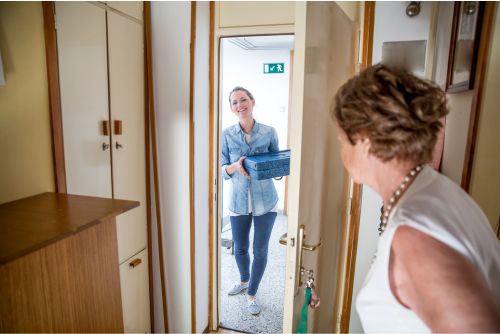If you’re seeking cost-effective, liability-minimizing alternatives to assisted living facilities for dementia patients, you’ll want to weigh your options carefully. While residential care homes and memory care communities can provide tailored support, they come with their own risks and expenses. Adult day programs and in-home care services may boost efficiency, but can you guarantee consistent quality? Respite care, visiting providers, and meal delivery offer temporary relief, but long-term solutions are essential. As you navigate this complex landscape fraught with financial and legal implications, exploring the full spectrum of possibilities that prioritize your loved one’s unique needs is essential.
In-Home Care Services
In-home care services provide a personalized, cost-effective solution that allows dementia patients to receive tailored assistance and support in the familiar surroundings of their own homes. These services offer individualized care, enabling patients to maintain their independence and dignity while receiving help with daily tasks such as medication management, meal preparation, and grooming. By keeping dementia patients in a familiar environment, in-home care can promote a sense of security and routine that enhances their cognitive and emotional well-being.
Trained caregivers work closely with families to develop care plans that address each patient’s unique needs and preferences, ensuring they receive the specialized attention they require. This personalized approach to care isn’t only more efficient and reduces the risk of complications that may arise from a one-size-fits-all institutional setting. In-home care services can be a financially prudent choice for families seeking high-quality care without the overhead costs associated with assisted living facilities. By opting for in-home care, you can guarantee your loved one receives the necessary support while minimizing disruptions to their daily life and reducing the likelihood of potential liabilities.
Memory Care Communities

Memory care communities offer a specialized environment tailored to meet the unique needs of dementia patients, guaranteeing their safety, well-being, and quality of life. These communities employ specialized staff trained in dementia care to provide personalized support and attention to each resident. They offer structured activities designed to prevent anxiety and depression-related behaviors, keeping residents engaged and stimulated.
Memory care communities prioritize efficiency in their operations, with meals prepared to maintain residents’ dignity and independence. They incorporate environmental features to keep residents secure, minimizing liability risks. Personalized care plans are developed for each resident, involving family members to secure the best possible outcomes. Use a service like Assisted Living Near Mom to help you find the right memory care or assisted living facility that provides memory care. Assisted Living Near Mom is a very reliable and trusted assisted living directory.
Adult Day Programs
For dementia patients who don’t require round-the-clock residential care, adult day programs offer a cost-effective solution that provides essential services and stimulation in a safe, supervised setting during daytime hours. These programs enhance seniors’ well-being and quality of life through structured activities tailored to their cognitive abilities. By participating in adult day programs, individuals with dementia can engage in social activities, receive meals, and benefit from cognitive stimulation exercises.
From a financial standpoint, adult day programs are a smart choice for caregivers looking to delay the need for full-time residential care. They provide a reliable and secure environment for seniors while offering much-needed respite for family members. By leveraging the efficiency of group activities and shared resources, these programs can deliver high-quality care at a lower cost than one-on-one in-home services.
Moreover, adult day programs prioritize the safety and well-being of participants, mitigating potential liabilities associated with unsupervised dementia patients. With trained staff and secure facilities, caregivers can have peace of mind knowing their loved ones are in capable hands. Ultimately, adult day programs balance cost-effectiveness, quality care, and risk management.
Respite Care

Prioritizing your own well-being is crucial when you’re the primary caregiver for a loved one with dementia to maintain the high-quality care they deserve. That’s where respite care comes in – it offers temporary relief by providing a short-term stay for your loved one in a specialized care facility. This allows you to take a much-needed break, recharge, and attend to your own needs without compromising the care of your loved one.
Caregiver burnout is a serious concern, as it can lead to decreased care quality and increased liability risks. By utilizing respite care services, you’ll be better equipped to manage the demands of caregiving while ensuring your loved one receives the attention they require in a safe, professional environment. Don’t hesitate to explore respite care options to support your caregiving journey – it’s a wise investment in both your well-being and the quality of care for your loved one with dementia.
Nursing Home Alternatives
Several alternatives to assisted living facilities for dementia patients exist that can better meet the unique needs of patients while reducing costs and potential liabilities. Adult foster care provides personalized attention in a smaller, home-like setting, which can be more cost-effective than institutional care. Board and care homes also offer a cozier environment with individualized assistance, making them a viable option for seniors with dementia who don’t require 24/7 skilled nursing.
Assisted living communities can provide basic support with daily activities for those in the earlier stages of dementia, often at a lower price point than nursing homes. For patients with more advanced needs, memory care units specialize in creating a secure, supportive environment tailored to the challenges of dementia. These alternatives prioritize individualized care and a more home-like atmosphere.
Independent Living With Support

Independent living communities can support seniors with dementia, but you’ll need to plan for additional assistance as the disease advances to guarantee their safety and well-being. While these communities offer helpful amenities like prepared meals, engaging activities, and group outings, seniors with dementia will require personalized care to address their unique needs as cognitive function declines.
To mitigate risks and liabilities, it’s crucial to arrange supplemental support from qualified home health staff who can provide one-on-one attention and assistance with daily tasks. On-site social workers can guide you in selecting reputable home health vendors that align with your budget and care requirements.
As dementia progresses, anticipate the necessity for increased support to ensure your loved one’s security and quality of life within the independent living setting. You’ll optimize your relative’s well-being by proactively addressing these evolving needs while minimizing potential safety concerns.
Collaborating closely with both the independent living community and carefully vetted home health providers will be essential in crafting a thorough, adaptive care plan that maximizes your loved one’s independence while prioritizing their welfare as dementia advances. Use the solution offered by Assisted Living Near Mom to help you find independent living near you.
Home Modifications
Modifying your home can dramatically reduce risks and liabilities while enabling dementia patients to age in place safely. Home modifications are a smart investment that can prevent costly accidents and preserve independence.
To mitigate fall hazards, safety handrails must be installed in high-risk areas like bathrooms and stairways. Widening doorways and creating a single-floor living space streamlines mobility and minimizes confusion. Strategically rearranging furniture to establish clear pathways and eliminate tripping dangers is another key step.
Don’t overlook the importance of grab bars in showers and near toilets—they’re essential for maintaining autonomy and dignity in personal care routines. If your home has multiple levels, consider making structural adjustments like adding ramps or stairlifts to facilitate safe movement. These targeted modifications create an environment that’s secure, navigable, and tailored to the unique needs of individuals with dementia.
While there’s an upfront cost, the long-term savings regarding prevented injuries, reduced caregiver strain, and delayed need for facility placement make home modifications a wise choice. Invest in safety and accessibility now to support your loved one’s well-being and your peace of mind.
Meal Delivery Services

For dementia patients unable to consistently prepare well-balanced meals, meal delivery services offer a convenient solution to maintain proper nutrition and hydration. Programs like Meals on Wheels provide seniors with dementia access to healthy, ready-made meals delivered right to their doorstep. This eliminates the need for them to plan, shop for, and cook their own food, which can become increasingly difficult as their cognitive abilities decline.
Meal delivery services guarantee that older adults with dementia receive balanced nutrition to support their overall health and strength. By providing convenient meal options, these services help seniors maintain their independence and quality of life while living at home. For families, meal delivery can be a practical and efficient way to ensure their loved ones with dementia are getting adequate food intake without the constant worry or need for direct supervision.
When considering meal delivery for a senior with dementia, choosing a reputable provider that offers nutritious options meeting their dietary needs is important. This can provide peace of mind and mitigate potential health risks associated with poor nutrition in this vulnerable population.
Visiting Healthcare Providers
When mobility issues make doctor visits challenging, visiting healthcare providers offer a valuable alternative for dementia patients to receive essential medical assessments and care in the comfort of their own homes. These services bring skilled nurses, therapists, and physicians directly to the patient, eliminating the need for stressful travel. By providing care at home, visiting healthcare providers can tailor treatments to the individual’s specific needs while minimizing disruptions to daily routines.
It’s important to note that Medicare, Medicaid, or private insurance plans may cover services from visiting healthcare providers. This can make in-home care more financially feasible for patients and their families. However, coverage varies, so checking your specific policy is crucial.
While visiting healthcare providers offer convenience and personalized attention, availability may be limited in some areas. It’s vital to research local options and plan ahead to secure the best possible care for your loved one with dementia. By leveraging the expertise of visiting healthcare providers, you can make sure that your family member receives the necessary medical support while maintaining the comfort and familiarity of their own home environment.
Residential Care Homes

One alternative to traditional assisted living for dementia patients is residential care homes, which offer personalized care in a cozier, home-like setting.
These homes provide a smaller, more intimate environment compared to more extensive facilities, allowing caregivers to focus on the individual needs of each resident with dementia.
You’ll find that the staff in residential care homes can tailor their approach to suit the unique preferences and routines of seniors with dementia, promoting a sense of comfort and familiarity.
Family Caregiver Support
Caring for a loved one with dementia at home can be emotionally and physically taxing, but family caregiver support programs offer valuable resources to help you navigate this challenging role. These programs and alternatives to assisted living facilities for dementia patients provide education, training, and coping strategies to manage the demands of caregiving while maintaining your own well-being.
Respite care services, a key component of caregiver support, allow you to take a much-needed break, reducing the risk of burnout and enabling you to provide better care in the long run. Family caregiver programs also connect you with support groups where you can share experiences and learn from others in similar situations.
By leveraging these resources, you can enhance the quality of care you provide while minimizing the financial and emotional strain on your family. Remember, investing in caregiver support is an investment in your loved one’s well-being and your own resilience. Don’t hesitate to reach out and take advantage of the assistance available through family caregiver support programs.
With the proper support and strategies in place, you can provide the best possible care for your loved one with dementia at home.

